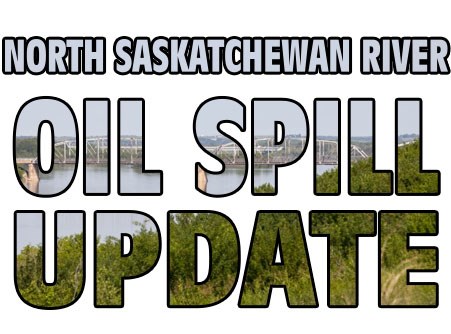The City of North Battleford has been given the go-ahead to reopen its water intake to the North Saskatchewan River.
According to a City news release, on Friday morning the Water Security Agency confirmed the water quality of the river to be safe and has approved reopening of the water intake structures in North Battleford, Prince Albert and Melfort.
According to a news release from the province, the water safety assessment done on the river indicated “oil components detected in the North Saskatchewan River do not present unacceptable health risks to residents whose treated water supply will be sourced from the river once intake use restarts. The results of the reports and testing done by the technical working group are consistent with what WSA found through an independent water sampling program.”
The full assessment can be accessed at www.wsask.ca.
Still, North Battleford indicates they intend to proceed with caution.
They will be bringing in a filtration system they planned to install at the water intake this fall as part of their response to the oil spill.
The plan is to use a temporary pre-treatment sand filtration system. The water would be sourced from the North Saskatchewan River, go through the filtration system, and then be treated at F.E. Holliday plant.
General Electric Water Systems developed the system and the original plan was to get it up and running around mid-September. The latest word from the City is that the system will be commissioned later this fall.
Husky Energy is covering the full cost for the lease of the equipment, according to the City.
The filtration system is the last portion of the three-pronged strategy the City announced in August to deal with the loss of the water supply from the river. The other two initiatives — a water line from Battleford as well as four new wells at Water Treatment Plant No. 1 — are now in use, allowing the vast majority of water restrictions to be lifted.
“Right now we have sufficient amount of water supplied by the Town of Battleford pipeline and the wells at WTP No. 1 to meet the water demand in our City,” said Mayor Ian Hamilton in a statement Friday.
“We want to make sure we can supply safe drinking water to our residents and that our Water Treatment Plant as well as our distribution system are protected. Once the additional filtration system in place we are confident that we can do that.”
The mayor also thanked both Husky Energy and the Water Security Agency for their efforts and support in this incident.
Another piece of news from City Hall Friday is that planned dredging work for the water intake is back on.
The dredging was supposed to have started in July, but was put on hold indefinitely due to the oil spill aftermath and cleanup.
That work will now commence again in the next couple of weeks. The City estimates it should be done by late fall, which should allow them to use the intakes without delay in 2017. If the dredging isn’t done in 2016 the work would have to be postponed to next year, as per the rules of Fisheries and Oceans Canada.
The decision by WSA to allow communities to turn on water intakes comes after an estimated 88 per cent of the oil has been recovered from the river, according to the province.
The overall water safety assessment was reviewed by a number of experts, including an internal Government of Saskatchewan science committee, external academic experts from the Universities of Saskatchewan and Alberta, Environment and Climate Change Canada, Health Canada and engineering consultants representing the municipalities.
The Water Security Agency has also advised municipalities to take the following actions: to adjust their water treatment process to account for the current water quality of the sources ensuring all standard quality regulations are met; to collect samples of treated water and test for petroleum components shortly after restarting use of the intakes before it goes into distribution; and to advise consumers of a potential change in water quality as systems are brought back online.
In the province’s news release Friday, the Water Security Agency said it supports the municipalities for taking further treatment options and in taking a cautious approach to restarting their intakes.

.png;w=120;h=80;mode=crop)


